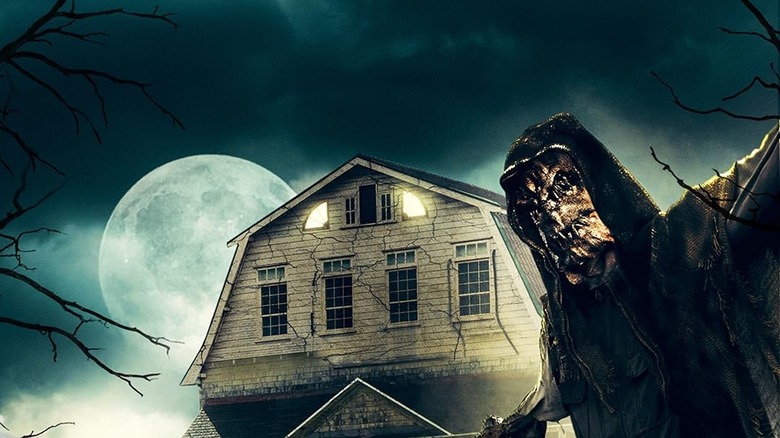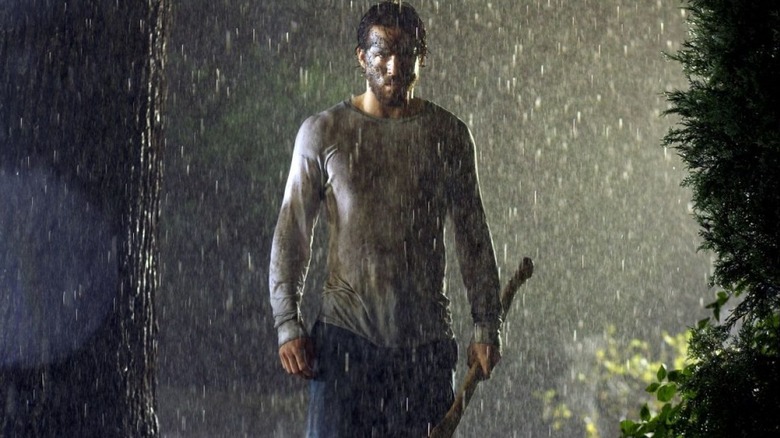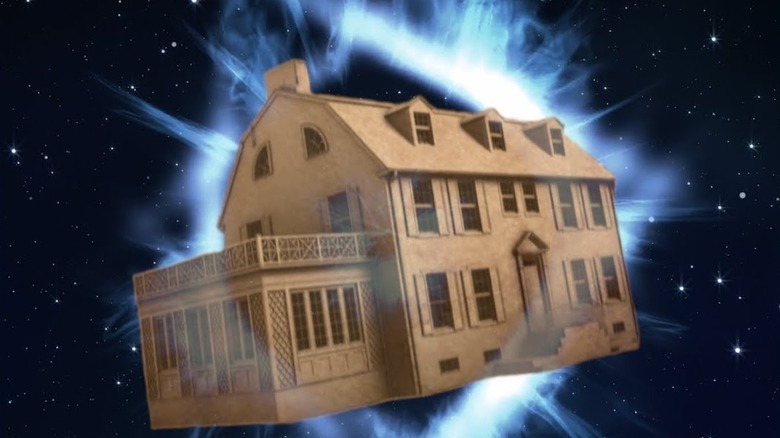The Real Reason There Are So Many Amityville Horror Movies
As far as classic, enduring horror movies go, it's hard to match "The Amityville Horror." It's not only beloved by many who grew up with it, but it was also in some ways ahead of the curve for our true-crime obsessed culture, as director Sturt Rosenberg's take on Jay Anson's book of the same name was inspired by the alleged paranormal experiences of the Lutz family after they moved into the house where Ronald DeFeo Jr. murdered his family in 1974.
More than just a single movie, "The Amityville Horror" went on to inspire an entire franchise, which consists of eight movies that were produced throughout the '80s and '90s. However, horror fans who have gone down the rabbit hole are surely aware that there are dozens of films that have made use of the "Amityville" name, which is taken from the village on Long Island in New York. These range from the relatively innocuous "The Amityville Haunting" to the downright absurd "Amityville Vibrator." Yes, that one is real.
That begs the question, why are there so many "Amityville" movies? In short, it has to do with the fact that nobody technically controls the IP in the way that most traditional horror franchises are controlled. Warner Bros. has the rights to "The Conjuring" franchise, but Amityville is merely a place. That's the crux of it.
Now, when it comes to adaptations directly involving the Lutz family or Anson's book? That's where things can get dicey, but the vast majority of the movies we're talking about don't have anything to do with the source material that helped make Amityville a household name.
The Amityville IP isn't controlled by anyone, really
The last truly notable theatrical entry in the franchise was 2005's "The Amityville Horror" remake starring Ryan Reynolds, which made $109 million at the box office at a time when horror remakes were all the rage. Just about everything else has been produced independently and released direct to VOD/streaming, or released with such a small theatrical footprint that it hardly mattered.
One exception was 2017's "Amityville: The Awakening," which absolutely bombed at the box office after being delayed for years on end. George Lutz, who was played by James Brolin in the original '79 film, actually sued "Amityville II: The Possession" and "Amityville 3-D" producer Dino De Laurentiis in 1989. The judge's findings from the case helped lay the groundwork for dozens of "Amityville" movies in recent years. Essentially, they ruled that the public associated the franchise with the DeFeo murders, and not the Lutz family specifically. Via Paste Magazine, the opinion read:
"The mass murder in the Amityville house and its supernatural legacy were well publicized at the time, drawing the attention of newspapers, magazines, television reports, the Church, and resulting in another book, Hans Holzer's 'Murder in Amityville.' And even plaintiffs do not dare claim to be the proprietary owners of all secondary associations resulting from this publicity."
"The second and third pictures were not about the Lutzes, who had no monopoly on the creation of horror stories set in the house where the DeFeo murders occurred," the judges added. "This case is nothing more than an unjustified attempt by plaintiffs to arrogate unto themselves the right to commercially exploit the name of the town of Amityville to the exclusion of the literary, artistic, and commercial worlds."
That was essentially that. Legally speaking, filmmakers could make use of what was deemed a highly publicized case as well as the town of Amityville, so long as they didn't focus on the Lutzes without their permission. For producers looking to make a quick buck, this proved to be rather important.
Amityville is an easy way to get brand recognition
If one heads to the free streaming service Tubi, there are no fewer than 50 different movies with the word "Amityville" in the title. The majority of them couldn't have less to do with the famed haunting that inspired this franchise in the first place. Rather, they are conceptually ridiculous, ultra-low-budget affairs that can generate curiosity clicks based on the absurd premise.
A few examples are 2022's "Amityville in Space," the shockingly timely "Amityville A.I.," and my personal favorite, "Amityville Death Toilet." There's also the creature feature of sorts in the form of 2022's "Amityville Scarecrow," which, itself, generated a franchise with "Amityville Scarecrow II" arriving that same year. The point is, these are the schlocky entries in the "Amityville" canon that have taken this from a horror franchise with less than 10 entries to an uncontrolled juggernaut of cheap slop with well over 60 movies and counting.
One might wonder how this can be profitable. Are enough people truly watching "Amityville Bigfoot" to make such ventures worthwhile? Without getting to look at the balance sheets of companies like Jagged Edge Productions or Wild Eye Releasing first-hand, the short answer is yes. This is nothing new. Mockbusters have been a part of Hollywood for decades. For every "Top Gun: Maverick," there is a "Top Gunner: Danger Zone" to go along with it.
These movies are generally made for pennies with bad special effects and up-and-coming actors who will work for practically nothing. It's built into the business model. The reason Amityville is worth having in those titles is that people will search for "Amityville" on their streaming service of choice or on the menu of their smart TV, and voila, some of these movies will pop up. And people will watch them out of curiosity or blissful ignorance. Either way, cheap "Amityville" movies have become a bizarre cottage industry.


